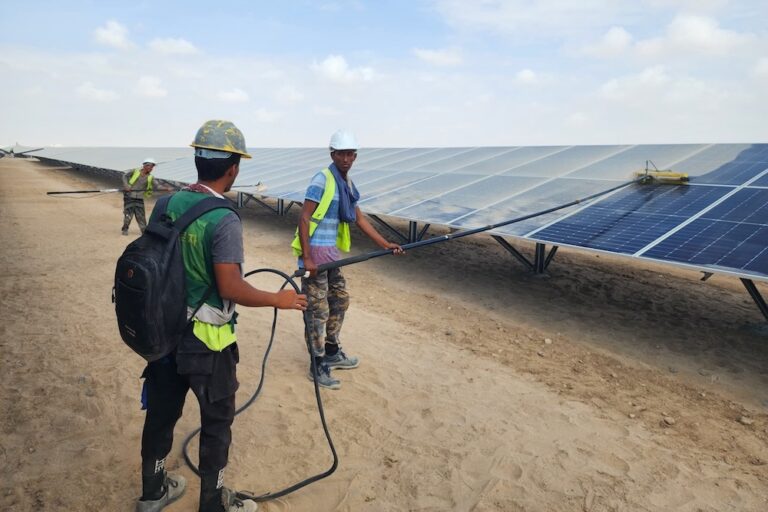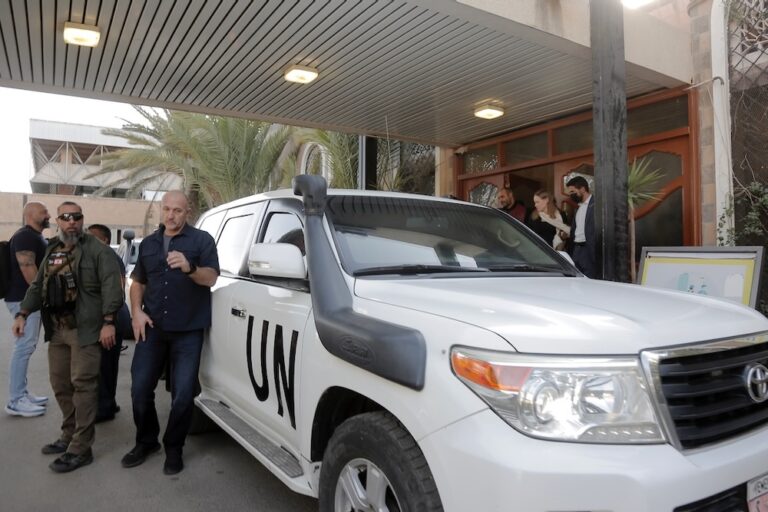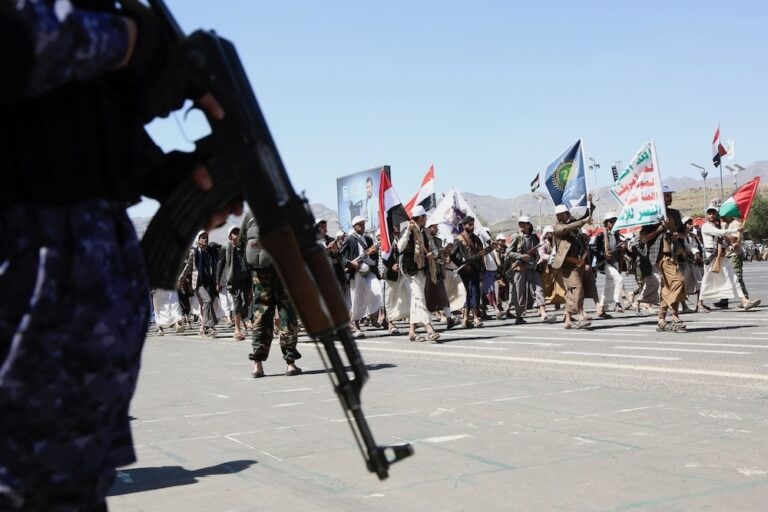Witnesses told Human Rights Watch that pro-government gunmen killed at least five anti-Saleh protesters who were participating in a peaceful march on 24 November in Sanaa.
(Human Rights Watch/IFEX) – New York, November 25, 2011 – Yemeni troops appear to have unlawfully killed as many as 35 civilians in the city of Taizz since a United Nations Security Council resolution demanded on October 21, 2011 that Yemen stop attacks on civilians, Human Rights Watch said today. Most of these civilians were killed in artillery shelling by the Yemeni army that indiscriminately struck homes, a hospital, and a public square filled with protesters, witnesses told Human Rights Watch.
The Security Council should work toward imposing an asset freeze and a travel ban on President Ali Abdullah Saleh and other senior officials responsible for these and previous attacks on civilians when it meets November 28 to discuss the crisis in Yemen, Human Rights Watch said. The Security Council also should dissociate itself from the portion of an agreement that Saleh signed on November 23 that offers the president and other top officials immunity for serious violations of international human rights and humanitarian law in exchange for leaving office.
“The army’s indiscriminate shelling in Taizz shows President Saleh’s brazen disregard for the lives of Yemeni civilians right up to the time he signed a deal to transfer power,” said Joe Stork, deputy Middle East director at Human Rights Watch. “Because President Saleh’s signature is only as good as the actions that follow, concerned governments and the UN Security Council should still impose targeted sanctions until these unlawful attacks stop and hold Yemeni authorities accountable.”
In Resolution 2014 of October 21, the Security Council called on the Saleh government to immediately end human rights violations in Yemen, including attacks on civilians by the security forces, and urged Saleh to cede power under an agreement brokered by the Gulf Cooperation Council (GCC). Saleh signed the GCC pact on November 23 but has yet to leave office. The pact offers Saleh immunity in exchange for relinquishing power, but the Security Council also declared that, “All those responsible for violence, human rights violations and abuses should be held accountable.” On November 28 the UN envoy to Yemen, Jamal Benomar, will brief the Security Council on the Yemeni authorities’ progress.
In November Human Rights Watch investigated shelled areas in Taizz, about 250 kilometers south of the capital, Sanaa, and interviewed nearly 50 witnesses, human rights activists, and medical workers about the recent attacks. Taizz has been a focal point for the mostly peaceful protests across Yemen that began in February against Saleh’s 33-year rule. Since June, government forces in Taizz have been fighting tribal opposition fighters and renegade troops who support the protesters.
Human Rights Watch found that army units conducted indiscriminate shelling in violation of the laws of war that probably accounts for the majority – if not all – of the 35 civilian deaths since October 21. The units deployed include the elite Republican Guards, under the command of President Saleh’s son Ahmed. Human Rights Watch also found that many opposition fighters were deployed in densely populated areas, unlawfully placing civilians at grave risk.
In addition to the attacks in Taizz, witnesses told Human Rights Watch that pro-government gunmen killed five anti-Saleh protesters who were participating in a peaceful march on November 24 in Sanaa, and that government forces and renegade soldiers continued deadly clashes there on November 25.
In Taizz, the deadliest attacks, on November 11, killed 14 civilians, including three women protesters in Freedom Square. Government shelling and other attacks that day also killed six children, including a four-year-old girl, in her home, three men at a shop near a mosque, another man in his home, and a patient at al-Rawdha Hospital, which was struck as emergency workers arrived with wounded from other attacks.
Artillery shells and gunfire from government positions struck Freedom Square that day as protesters amassed for a midday rally called the “Day of Rejecting Immunity” for Saleh, three witnesses told Human Rights Watch. One shell landed in the midst of 10 women gathered for prayer, said Siraj Munir al-Adib, 25, who had been seated in an open tent.
Bullets were passing over our heads. I saw Abdullah Althaifani [a Taizz protest leader and university professor] shot by live fire in his right shoulder, in front of me. A few minutes later I heard a big explosion a few meters away. I ran over and saw women who were injured by shrapnel. They were screaming. Three others were killed.
About 20 opposition fighters protecting the protesters were stationed about 300 meters from the women, but they were not inside the square and there was no fighting nearby, the three witnesses said.
Protesters and emergency workers rushed the casualties from Freedom Square and other areas under attack to al-Rawdha Hospital, only to come under renewed shelling. Seven artillery and mortar shells struck the hospital over the course of several minutes, starting around 1 p.m., five witnesses said. One shell tore a hole through the wall of the fourth floor. A man fell through the hole to the street below and died soon after, witnesses said.
( . . . )


